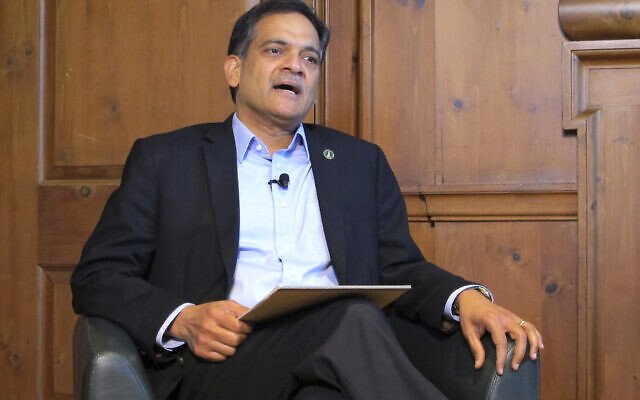Ofek Preis won’t walk to class by herself anymore. She’s afraid of being harassed for being Jewish.
“I’m just so burnt out from this. I just want to go to class and have a normal class. Then I remember that there is so much antisemitism here. It can be really debilitating,” said Preis, a 21-year-old senior at State University of New York (SUNY) New Paltz.
“It’s shocking and triggering. You start to feel you have no control of your learning environment; you feel unsafe everywhere,” she told The Times of Israel.
Preis isn’t alone: Jewish students across the United States report being excluded from campus organizations, targeted on social media and harassed in classes by students and professors alike. Additionally, they’ve seen dormitories and sidewalks vandalized with swastikas, and buildings plastered with flyers that equate Birthright trips to Israel with genocide and call for Zionists to “fuck off.”
Yet, often lost in the coverage of these incidents is the emotional toll they take on the Jewish students.
For Preis, the ordeal began after she transferred to SUNY New Paltz from SUNY Geneseo in the fall semester of 2021.
An Israeli studying abroad, Preis was allegedly kicked out of New Paltz Accountability, a sexual-assault survivors’ support group, together with classmate Cassie Blotner, for posting about their Jewish identity on social media. Accused of white supremacy, the girls were targeted on the YikYak social media platform in the spring of 2022 with an anonymous post encouraging students to spit on “the Zionists.”
Pilloried on social media and vilified on campus, Preis said the situation became unbearable. Jittery, anxious, and unable to concentrate, she took most of her classes online for several weeks. She also moved into an off-campus apartment. The decision helped her emotionally but not academically.
Once a double major in political science and sociology, Preis said she fell behind in her studies. Forced to choose between graduating later to make up political science credits or dropping it as one of her two majors, she’s now a sociology major with a political science minor.
“It’s hard to muster up the energy to just get through my day. As a sexual assault survivor it was already a struggle, but this [antisemitism] added another layer to feeling that our safety and well-being is not protected here,” Preis said.
The US Department of Education’s Office for Civil Rights is now investigating SUNY New Paltz for not protecting Jewish students and addressing campus antisemitism. The investigation will determine whether the university violated Title VI of the 1964 Civil Rights Act, which prohibits discrimination based on race and religion.
The Department of Education is also investigating complaints against the University of Vermont (UVM), University of Illinois Urbana-Champaign and University of Southern California (USC).
That around 2,000, or 20%, of UVM’s 11,626 undergraduate students are Jewish was a draw for one student, who, fearing a backlash, spoke on condition of anonymity.
“It was so important to me to go to a school with a strong Jewish presence that I wrote about it for my college application essay,” said the UVM junior.
When she arrived at the bucolic school situated a mile from Lake Champlain, she appreciated the variety of student organizations. Some were dedicated to climate change, others to books. Some to crafts, others to social justice.
Her excitement soon evaporated.
In May 2021, UVM Empowering Survivors, a sexual assault survivor support group, posted antisemitic comments on Instagram. Then a university teaching assistant reportedly targeted student supporters of Israel on Twitter. For example, on April 5, 2021, the TA wrote, “is it unethical for me, a TA, to not give zionists credit for participation??? i feel its good and funny, -5 points for going on birthright in 2018, -10 points for posting a pic with a tank in the Golan heights, -2 points just cuz i hate ur vibe in general.”
The university and its president, Suresh Garimella, declined to comment about the school’s handling of claims of antisemitism.
Instead, the president’s office referred to Garimella’s statement regarding the Title VI investigation, in which he said the media coverage of the Department of Education’s investigation “has painted our community in a patently false light.”
“UVM is home to a strong and vibrant Jewish community and is recognized as a place where — year after year — many Jewish students, faculty, and staff choose to study, teach, conduct research, practice medicine, and work,” the statement said.
The UVM junior found no solace in his statement.
Liora Rez, executive director of StopAntisemitism, said Garimella’s email is another example of an administration’s failure to act.
“They are not protecting the mental health of Jewish students,” Rez said. “So many of these students feel tremendous insecurity. Some ultimately feel the need to hide their Jewish identity or support for Israel. On the macro level that leads to stress and many students have a tough time throughout the day.”
According to the watchdog group’s latest report, 55% of respondents answered “yes” when asked if they’ve experienced some form of antisemitism at their school. Only 28% of students said they feel their school administration takes antisemitism and the protection of Jewish students seriously.

